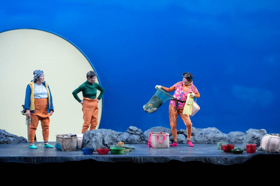Review: ENDLINGS World Premiere at American Repertory Theater

Endlings
Written by Celine Song, Directed by Sammi Cannold; Scenic Design, Jason Sherwood; Costume Design, Linda Cho; Lighting Design, Bradley King; Sound Design/Original Music, Elisheba Ittoop; Production Stage Manager, Alfredo Macias
CAST (in order of speaking): Emily Kuroda, Wai Ching Ho, Jo Yang, Jiehae Park, Miles G. Jackson, Keith Michael Pinault, Matt DaSilva, Andy Paterson, Mark Mauriello
Performances through March 17 by American Repertory Theater at Loeb Drama Center, 64 Brattle Street, Cambridge, MA; Box Office 617-547-8300 or www.americanrepertorytheater.org
With North Korea so much in the news these days, the American Repertory Theater is offering the opportunity to take a virtual trip to that part of the world with its production of Celine Song's new play, Endlings. Set in part on South Korea's remote Man-Jae Island, and in part on the island of Manhattan, the Korean-Canadian-American playwright whisks us across borders, plunges us into the depths of the ocean, and endeavors to convey the immigrant experience and advocate for the concept that everyone has a right to just exist.
The play opens on a beach where three elderly haenyeos (women sea divers) are going about their preparations to dive, talking about a range of subjects from children to dying. They are the last of their breed (endlings: the last known individuals of a species) and, despite their advanced ages, they work all day, every day. Han Sol (Wai Ching Ho) is in her 90s and plans to be the next to die; Go Min (Emily Kuroda) is in her 80s; and Sook Ja (Jo Yang) is in her 70s and expected to be the last to go. They're cranky and funny and matter-of-fact, and they look out for each other, but share a total absence of sentimentality. Their husbands and children are long-gone, either deceased or moved off-island, but they have television and satellite dishes.
Midway through the first act, the lights dim on the main stage and a spotlight shines on Ha Young (Jiehae Park), a Korean-Canadian Manhattanite in her late 20s, on a platform downstage left. She identifies herself as the playwright of this play and gives the background of her family's history vis-a-vis the Korean War, her own immigration story, and her penchant for writing so-called white plays. She is engaging and energetic in her commentary, opening an exploration into her connection with the haenyeos, her ancestors, and her own story as an author and immigrant, before returning our attention to the three women.
When the second act opens with a totally white mock-up of the Manhattan skyline in the foreground, Ha Young and her white husband (Miles G. Jackson) sit contained within a small square of light to indicate their tiny New York apartment. The focus becomes meta-referential as the couple discusses the play, whether or not it is any good, and question why she wrote it. Without warning, after black-clad stagehands reset the stage, Ha Young and hubby board a subway car, where they encounter an unexpected pop-up performance, and then they arrive at the Loeb, making a late entrance to view the play. However, they aren't there to see Endlings; rather, they witness a white play, with white actors talking about white events, with stilted white dialogue. And then Ha's cellphone rings. It is all quite surreal.
Song has bitten off a gargantuan challenge to make this all make sense, and it depends on one's perspective as to whether or not it is more than she can chew. Fortunately, she has wunderkind director Sammi Cannold pulling the threads together, and the daring and overall willingness of the ART to think outside the box. Exhibit A is the giant water tank beneath the stage that allows us to see the haenyeos in their underwater element. It is the most compelling feature in a terrific comprehensive design, and drives our understanding of the beauty and danger of their work in a visceral way.
Scenic designer Jason Sherwood and lighting designer Bradley King combine their talents to bring us to the island beach where the women spend their days, with a giant orb on the backdrop that moves laterally across the ever-changing colors of the sky to show the passage of time. Three simple house frames descend on wires when the women return home at the end of a long day. Linda Cho's costume designs include diving clothes, as well as traditional Korean outfits, and a giant, anthropomorphic turtle (Mark Mauriello) who swims with the divers in the tank. Original music by Elisheba Ittoop adds atmosphere to the underwater scenes, and her soundscape covers the gamut from ocean to wind to city traffic and that annoying cellphone.
Endlings is an unusual work that consists of a multitude of moving parts and a slew of themes. At times, it feels like Song is thinking out loud as she tries to determine what kind of a playwright she wants to be, who she is writing for, and which of her hyphenated personae she wishes to take center stage. The portion of the play that focuses on and honors the elderly haenyeos is delightful, in equal measure owing to the writing and to the performances of the three actors who inhabit their characters. The dichotomy between the two acts is jarring, the latter feeling too disjointed to follow all of its threads. However, by bringing together Han Sol and Ha Young as a coda, Song makes a connection between the two who are generations and worlds apart. They both just want to exist.
Photo credit: GretjenHelene.com (Emily Kuroda, Wai Ching Ho, Jo Yang)
Reader Reviews

Videos

